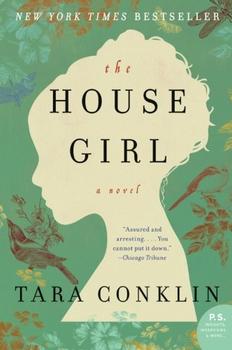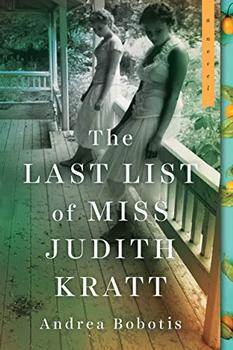Summary | Excerpt | Reading Guide | Reviews | Beyond the book | Read-Alikes | Genres & Themes | Author Bio

Tara Conklin's The House Girl is a top choice among BookBrowse readers. 21 out of 23 reviewers gave it 4 or 5 stars! Here is what they say about this highly regarded book:
The House Girl is about finding yourself and finding your history. It's about defining yourself on your own terms and not by others. Most important it is about love, regret and the need for justice. I thought this was an excellent debut novel, and I would definitely read another by Conklin (John W). This isn't just a story that evokes the tragedy of those enslaved in the South, but rather a silver lining of hope… that their lives took on greater meaning and purpose when they started to intersect with others. It's through this intersection where the ripples of small kindnesses and hours of bravery began to change the lives of others…Oppression comes in different forms, as even those who live free are not always free to do what their hearts desire (Marjorie C). I've read many books set in the U.S. slavery era, and this is one of the best. It poses a unique connection between a young slave "house girl" and a driven New York lawyer (Valerie C). The House Girl portrays an inspiring story of how, through art, a person survives long after leaving this world (Julie M).
Some readers were especially moved by the way Conklin brought a very painful part of American history to life:
The main characters are completely engaging and while the storyline was often hard to read and a reminder of just how awful parts of our history are, it was still very worthwhile and I highly recommend this book (Martha D). I was originally skeptical about how the story could honestly address the pros/cons of reparations without sounding preachy or dismissive, but Conklin managed to give the issue the respect it deserved, without losing the character focused flavor of the book. Like all good books, in my opinion, The House Girl gives us characters we care deeply about, and asks us to think about some tough issues. This wonderful book will stay in your heart and mind long after you have finished the last page (Judy S).
Other readers were impressed with the way Conklin so smoothly and effectively wove together two time periods:
It is cleverly conceived, weaving back and forth from the mid-19th century to the present time, as well as weaving in characters from the past and present as they become relevant to the story. The author made me care deeply about the characters and want to know them. She has a gift for describing long ago events so that the reader can picture them (Carol R). The story line of the young lawyer paralleled with Josephine the slave girl both seeking their life's meaning more than 150 years apart was very engaging. These were characters so rich and emotionally satisfying that you truly came to care about what they were going through (Lynne B). The plot is fresh and interesting with some twists I didn't see coming. It is well written. The author manages to keep the "voice" of her characters distinctive throughout the novel (Kathryn K). It took me a while to get drawn into this book. I was skeptical about the slavery reparations lawsuit that serves as a catalyst for Lina Sparrow's search and I feared another slave narrative. However, about half way through the book, I realized I was in masterful hands…I loved the focus on female artists and the questions of creativity, love, and relationships (Emily G).
Although a couple of readers didn't feel that the dual narrative fully worked:
I was spellbound as the narrative propelled me forward, the two stories weaving closer and closer together in both inevitable and unexpected ways. Alas, for me, the spell was broken in the last third of the novel when the narrative veered from these two voices into those of more minor characters (Naomi B). I could not connect with Lina's story, a sometimes borderline Harlequin romance type of story (Catherine H).
But, in the end, almost everyone felt as though this was a book that would appeal to many readers:
As a high school English teacher, this book appeals both to the adult reader in me and to the teacher of adolescents who will equally enjoy this look back in time (Sue H). I would highly recommend this to all booklovers but especially people who enjoy good historical fiction (Sherrie B). I believe this would make an excellent addition to an Art History class or a Civil Rights class, which focuses on slavery in the South. The tone of the book is uplifting, shattering past the blights of misery to yield a lens into how strong women can be in the moments that count the most (Marjorie C).
![]() This review was originally published in The BookBrowse Review in March 2013, and has been updated for the
November 2013 edition.
Click here to go to this issue.
This review was originally published in The BookBrowse Review in March 2013, and has been updated for the
November 2013 edition.
Click here to go to this issue.

If you liked The House Girl, try these:

The Last List of Miss Judith Kratt
by Andrea Bobotis
Published 2019
Some bury their secrets close to home. Others scatter them to the wind and hope they land somewhere far away.

by Robin Oliveira
Published 2019
From the New York Times bestselling author of My Name Is Mary Sutter comes a rich and compelling historical novel about the disappearance of two young girls after a cataclysmic blizzard, and what happens when their fate is discovered.
The thing that cowardice fears most is decision
Click Here to find out who said this, as well as discovering other famous literary quotes!
Your guide toexceptional books
BookBrowse seeks out and recommends the best in contemporary fiction and nonfiction—books that not only engage and entertain but also deepen our understanding of ourselves and the world around us.